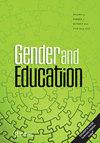Men’s career choices in early childhood education and care – an embodied intersectionality perspective
IF 1.9
3区 教育学
Q2 EDUCATION & EDUCATIONAL RESEARCH
引用次数: 0
Abstract
ABSTRACT The workforce in early childhood education and care (ECEC) is highly gender-segregated with a majority of women. Gender-sensitive professionalization is regarded a way to recruit more men, but there is a call for more empirical research into perspectives that combines bodily aspects of gender, professionalization and men`s career choices. Applying the notion of embodied intersectionality, this article analyses narrative data from Nordic men with varying experience with formal ECEC education and work. It explores how embodied and intersectional experiences of ECEC work and professionalism emerge in the narratives and how embodied and intersectional experiences link to the men’s choices of entering, staying, or leaving ECEC. Such experiences appear in the narratives related to entry to and exit from formal ECEC education to parental cooperation and to professional play practices. The findings are discussed in relation to the professionalization of ECEC, professional exclusionary and inclusionary mechanisms and debates about ECEC professionalization.儿童早期教育和护理中的男性职业选择——一个具体的交叉性视角
摘要幼儿教育和护理(ECEC)的劳动力与大多数女性存在高度的性别隔离。对性别敏感的职业化被认为是招募更多男性的一种方式,但也有人呼吁对性别、职业化和男性职业选择的身体方面进行更多的实证研究。运用体现交叉性的概念,本文分析了北欧男性在正式ECEC教育和工作中不同经验的叙事数据。它探讨了ECEC工作和专业精神的具体和交叉体验如何在叙事中出现,以及具体和交叉经验如何与男性进入、留下或离开ECEC的选择联系在一起。这些经历出现在与进入和退出正式的欧洲幼儿教育委员会教育、父母合作和专业游戏实践相关的叙述中。研究结果与欧共体的专业化、专业排斥和包容性机制以及关于欧共体专业化的争论有关。
本文章由计算机程序翻译,如有差异,请以英文原文为准。
求助全文
约1分钟内获得全文
求助全文
来源期刊

Gender and Education
EDUCATION & EDUCATIONAL RESEARCH-
CiteScore
5.20
自引率
9.10%
发文量
31
期刊介绍:
Gender and Education grew out of feminist politics and a social justice agenda and is committed to developing multi-disciplinary and critical discussions of gender and education. The journal is particularly interested in the place of gender in relation to other key differences and seeks to further feminist knowledge, philosophies, theory, action and debate. The Editors are actively committed to making the journal an interactive platform that includes global perspectives on education, gender and culture. Submissions to the journal should examine and theorize the interrelated experiences of gendered subjects including women, girls, men, boys, and gender-diverse individuals. Papers should consider how gender shapes and is shaped by other social, cultural, discursive, affective and material dimensions of difference. Gender and Education expects articles to engage in feminist debate, to draw upon a range of theoretical frameworks and to go beyond simple descriptions. Education is interpreted in a broad sense to cover both formal and informal aspects, including pre-school, primary, and secondary education; families and youth cultures inside and outside schools; adult, community, further and higher education; vocational education and training; media education; and parental education.
 求助内容:
求助内容: 应助结果提醒方式:
应助结果提醒方式:


